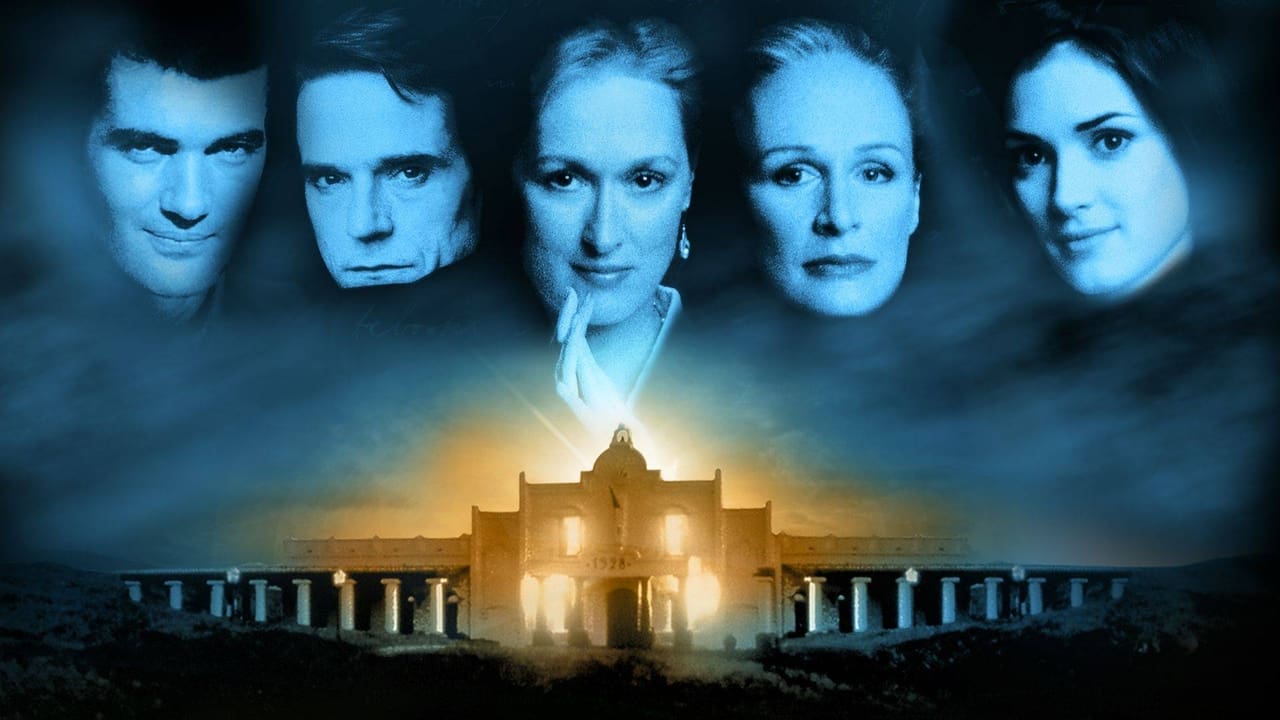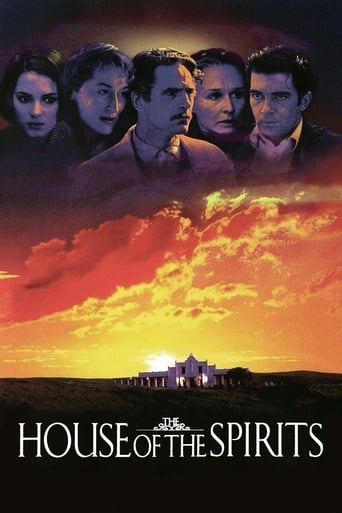



Excellent, a Must See
In truth, there is barely enough story here to make a film.
View MoreIn other words,this film is a surreal ride.
It is an exhilarating, distressing, funny and profound film, with one of the more memorable film scores in years,
View MoreIt was a great film when it came out. The acting is still absolutely astonishing and admirable and yet there is something that is missing twenty-two years later. The film is so centered on the main character, Esteban Trueba, and his family, or rather his personal history in Chile, his economic fight to raise himself by his own effort over his lot, to become one of the most economically powerful, and later one of the most politically powerful men that we do not really capture the country itself. What is shown of the working class movement is just really anecdotal. Too close to the tragedy in 1993 the film does not show Allende's party, which was not the Communist Party of Chile, using Lenin and Stalin as direct political references. Their approach was tremendously sectarian and that explains this, and vice versa. They only won the election with slightly more than one third of the votes which was not enough and the enthusiasm of the beginning wore out rather fast. The film is silent about the real conspiracy with the support of the USA and with the deranged support of the Conservatives who did not even understood what they were doing, at least that's what the film shows though I am sure it was not that simple: these politicians supported the putsch and for a long time then Pinochet himself. The film is silent on the length of his reign, on the difficulty the country faced later on when he was to be removed, etc. It is nearly a miracle that some democratic order could be re-established in this country. It is true 1993 was too close: the distance was not enough to be able to really get into some detail about the contradictory situation the victory of El Pueblo Unido brought into Chile with Allende first and then Pinochet.The film is silent too on the fact the US embassy was not the refuge for escaping revolutionaries because the USA were on Pinochet's side all along. Canada was the only viable option indeed. So twenty-two years after the film and forty-two years after the putsch the film is rather nothing but a denunciation of harsh working conditions for the working class, of military arrogance and violence when "service men" meddle with politics, the full inhumanity of the politicians who accepted the adventure of a military coup, and the purely family-oriented empathy of Esteban Trueba at the end of the film. The fact that Blanca was questioned during her detention by her half brother was sentimentalese and such a connection between the torturer and the tortured person was a fair guarantee that the questioning would fail because on the torturer's side there was a desire for revenge, hence the use of pure violence for the sake of violence, and on the side of the tortured person, Blanca, there was a strong feeling of resistance, hatred, desire to fail that intruder, that out of wedlock competitor, challenger, dominator. There should never be any relation of that sort between the two sides of a questioning session of that type, i.e. under duress.So the only thing we have at the end is that decision of Blanca's to wash away any desire of revenge or vengeance, but we know that in 1993 that could not be true and even today it sounds very difficult. We have very few examples of that nature and South Africa does not really qualify because in that case the dictatorial power (the apartheid government) just passed that power to their opposition whose leader they liberated from prison on the occasion. For that feeling to be believable you need distance and a tremendous political change that can bring reconciliation. But the real objective was and still is justice in such cases.The film then has strong scenes and moments but altogether it has become too sentimental and politically superficial to be believable.Dr Jacques COULARDEAU
View MoreIn a carbon copy of the type of role that Vincent Price and George Sanders would have played in the 1940's, Oscar Winner Jeremy Irons gives a rather harsh performance as a true villain whom you want to see be killed off rather than the other characters in this who do die early on. He rapes a young woman living on his property (simply grabbing her as he gallops by on his horse) with no apparent motive or remorse, mistreats his sister (Glenn Close) and beats his wife (Meryl Streep) when she points out truths about him that prove he's a hypocrite after accusing their daughter (Winona Ryder) of being sexually loose.Ghostly visits of the dead return to remind him of the curse they placed upon him in life, rebels take over his regime while allowing him to keep his riches (rendering him powerless to truly enjoy them), and he's almost on the verge of being totally alone when God comes along to give him one more chance to atone. If you've ever longed to see the wonderful Meryl Streep and Glenn Close work together, this is it, and their characters share a closeness that can't be matched within Streep and Irons' marriage. But for Irons, the two sisters-in-law are living too "Glenn Close for Comfort" as underlying lesbian overtones indicate an affection Irons won't allow.He's not really capable of love, and his physical needs seem to be minus passion and any amount of tenderness. At least in "The Color Purple", a similar film where atonement came for a villain, you did see a lot more humanity in that character (played by Danny Glover) than you do with Irons here. I totally despised him even more than his sinister Klaus Von Bulow in "Reversal of Fortune" and longed to see him get his just reward long before the film was over.This covers four generations of two cursed families. It also covers a lot of history, and it seems to be a story probably better told as a mini-series rather than a 2 1/2 hour movie. Like the overlong "Dances With Wolves", I was ready to give up on this long before it was over, sensing that every time a plot was resolved it was ending, but it switched gears to move onto another storyline. By the time the film reaches the political intrigue where Ryder is violated in prison, I had to remind myself that it only had another half hour to go and just hang in there.Wasted in pointless supporting roles (actually nothing more than cameos) are Vanessa Redgrave and Armin-Mulher Stahl, and Antonio Banderas's character is never truly fleshed out to make much of an impact. While impressively filmed, there was too much psychological ugliness to make the beauty strike my eye. Sometimes an all star epic like this where the structure and presence of too many "A"-list stars make the pie too filling. Even if it is both the follow-up for Irons and Streep, Irons and Close, and the chance to see the two greatest divas of the past 30 years together that will remain in my cinematic eye, this one is a depressing indication that when two powerhouse actors want to work together, they should make sure that all the ingredients are there to make the project completely work.
View MoreI had the pleasure of catching this movie on Netflix after almost 13+ years. I was only 14 the last time my cousin, sister and I had sat together one warm summer afternoon and watched this on HBO. After that I didn't remember the name of the movie, just knew enough to know that Meryl Streep was in it. The movie made a mark on my childhood, I was deeply engrossed by the mystical capabilities on Streep. Her poignance and courage in the movie paved the way for much of the artsy feeling I enjoyed. Years later I still love the movie, frankly because it brought back memories of my childhood and I got a chance to relive it all.
View MoreBrilliant adaptation of the novel that made famous the relatives of Chilean President Salvador Allende killed. In the environment of a large estate that arises from the ruins, becoming a force to abuse and exploitation of outrage, a luxury estate for the benefit of the upstart Esteban Trueba and his undeserved family, the brilliant Danish director Bille August recreates, in micro, which at the time would be the process leading to the greatest infamy of his story to the hardened Chilean nation, and whose main character would Augusto Pinochet (Stephen similarities with it are inevitable: recall, as an example, that image of the senator with dark glasses that makes him the wink to the general to begin making the palace).Bille August attends an exceptional cast in the Jeremy protruding Irons, whose character changes from arrogance and extreme cruelty, the hard lesson that life always brings us to almost force us to change. In Esteban fully applies the law of resonance, with great wisdom, Solomon describes in these words:"The things that freckles are the same punishment that will serve you." Unforgettable Glenn Close playing splint, the tainted sister of Stephen, whose sin, driven by loneliness, spiritual and platonic love was the wife of his cruel snowy brother. Meryl Streep also brilliant, a woman whose name came to him like a glove Clara. With telekinetic powers, cognitive and mediumistic, this hardened woman, loyal to his blunt, conservative husband, is an indicator of character and self-control that we wish for ourselves and for all human beings. Every character is a portrait of virtuosity (as Blanca worthy rebel leader Pedro Segundo unhappy ...) or a portrait of humiliation, like Stephen Jr., the bastard child of Senator, who serves as an instrument for the return of the boomerang. The film moves the bowels, we recreated some facts that should not ever be repeated, but that absurdly still happen (Colombia is a sad example) and another reminder that, against all, life is wonderful because there are always people like Isabel Allende and immortalize just Bille August.
View More